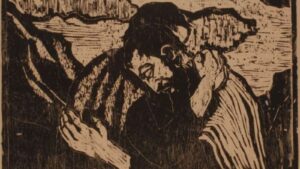Frequently Bible readers overlook the nuance and power of the patriarchal narratives (Genesis 12-50), because we think of them as just the stories of powerful, ancient men. AbrahamGod promised that Abraham would become the father of a great nation, receive a land, and bring blessing to all nations. More had a couple kids when he was old, IsaacSon born to Abraham and Sarah in fulfillment of God's promise. More almost got killed, and Joseph had a neat coat. But there is much more going on below the surface, if we only take the time to re-read stories of trauma and abuse—and sometimes healing—in the texts.
Much recent Biblical scholarship has taken up the case of HagarSarah's maidservant, Abraham's concubine, Ishamel's mother. More, Sarah’s slave, whom SarahAbraham's wife and mother of Isaac. More offered to Abraham as a sexual and reproductive surrogate. Slaves cannot meaningfully consent to sex. So scholars and activists have rightly pointed out that Sarah and Abraham collaborated to rape and impregnate Hagar. But how could Sarah so easily offer up a fellow human to take her place, as another wife to Abraham (Genesis 16:3)?
Sarah was also undergoing her own traumatic experience of being sex-trafficked, though we scarcely name it as such. Everywhere that Abraham and Sarah journeyed, Abraham told her to tell people that she was his sister (and thus available for marriage), rather than his wife (Genesis 20:13). Sometimes, as in Gerar, the person to whom Abraham sold Sarah was prevented from touching her (Genesis 20:4-6). Other times, as in Egypt, Abraham received a bride price, and then the person “took [Sarah] as [his] wife” (Genesis 12:19). (For clarity, “dowry” is a transfer of wealth or resources from the bride’s family to the groom’s family. “Bride Price” is a transfer of wealth or resources from the groom’s family to the bride’s family.) In the bride price that Pharoah paid to Abraham for Sarah (Genesis 12:16), there were a multitude of animals, but also male and female servants. Ancient commentators recognized that Hagar probably came into Abraham and Sarah’s householdA household is a living unit comprised of all the persons who live in one house. A household would embrace all the members of a family, including servants and slaves. In the book of Acts, stories are told of various persons and their households, like... More as part of Sarah’s bride price. If Hagar was a daily reminder of how Sarah’s husband had sold her, or attempted to, nearly every place they went, no wonder Sarah felt comfortable using Hagar and controlling her sexuality, as hers had been controlled. Feminist theorist bell hooks urges us to remember the humanity of those who marginalize others while at the same time holding them accountable for their continued marginalization of others. In essence, Sarah is an example of the old adage: “hurt people hurt people.”
In addition to examples of unheard and under-appreciated stories of gendered trauma against women, there are multiple stories of rape and sexual assault against men in the patriarchal narratives. One of the lies of hetero-patriarchy is that men are sexually dominant and “do sex” to women, who passively “receive sex” from men. However, LeahLaban's oldest daughter and Jacob's first wife. More, at the order of her father LabanRebekah's brother, Jacob's uncle and father-in-law, Rachel and Leah's father. More, had sex with JacobThe son of Isaac and Rebekah, renamed Israel, became the father of the twelve tribal families. More, who was deceived and did not consent to have sex with her (Genesis 29:23-25). Intentional deception by sexual partners is rape, no matter who does it. Indeed, Leah’s disdain for Jacob’s sexual agency was so great that on another occasion, she bought Jacob’s sexuality, and only informed him of the matter after the fact (Genesis 30:14-16). The text is explicit in Genesis 19 that Lot’s daughters raped him, and he neither knew when they laid down, nor when they got up. (Though, because of a scribal mark, there is some reason to think that LotNephew of Abraham and Sarah. More may have become conscious when his older daughter got up after raping him.) And of course, the story of Potiphar’s wife sexually assaulting Joseph is well known, but frequently discussed as Joseph resisting his own temptation, rather than escaping sexual assault from a woman who lusted after him, as it is presented in the text (Genesis 39:7-12). Genesis presents several examples of male victims of trauma, as well as numerous female victims.
Lastly, a close reading of patriarchal narratives reveals repeated patterns of abuse and deception. RebekahIsaac's wife, and mother of Jacob and Esau. More and Laban, sister and brother from Paddan Aram, used nearly identical schemes to get what they wanted for their children. After her journey from Paddan Aram to Canaan, Rebekah forced Jacob to pretend to be his sibling, to go into a tent and deceive someone into giving Jacob what he had already purchased (Genesis 27:5-17; Genesis 25:29-34). After Jacob’s journey from Canaan to Paddan Aram, Laban forced Leah to pretend to be her sibling, to go into a tent and deceive someone into giving up what Jacob had already purchased (Genesis 29:15-25). Intersections of gender, power, migration, deception and cultural practices all play a role in creating traumatic intergenerational family situations.
The patriarchal narratives of Genesis are more than just the stories we may be familiar with from Sunday School. Instead, they are complex and highly nuanced depictions of an extended family struggling in relationship with God and with one another. By reading these stories as a series of traumatic events that the protagonists survive and overcome, modern readers, especially survivors, can draw strength for our own journeys.





